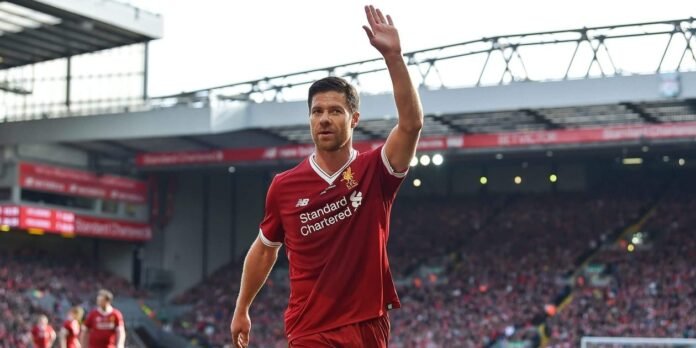Rival managers are rarely granted warm receptions at Anfield. Xabi Alonso, however, will be an exception.
Bayer Leverkusen’s visit to Merseyside tonight will be the first time the Spaniard has been involved in a competitive fixture against Liverpool since he left to join Real Madrid just over 15 years ago.
Back then, he was a classy midfielder who was adored by the Kop as a hero of the 2005 Champions League final triumph over AC Milan in Istanbul, one of 210 appearances he made during a five-year spell on Merseyside. Now he is a Bundesliga-winning manager, having guided Leverkusen to an historic league and cup double last season.
Many fans may have expected him to be directing play tonight from the home dugout. Alonso was the early favourite to succeed Jurgen Klopp when the German announced his exit in January, but he ruled himself out of contention for both the Liverpool and Bayern Munich jobs in March.
It came as no surprise to Liverpool sporting director Richard Hughes as discussions with Alonso’s agent Inaki Ibanez had long since indicated that he was unlikely to be available. It meant that Alonso was not part of the process by the time that the merits of possible contenders were being seriously considered.
Hughes’ data-led search for a new head coach ultimately led him to Feyenoord’s Arne Slot, who was an overwhelming first choice. After a flying start to the Dutchman’s tenure, it increasingly looks like an inspired appointment.
But the affection for Alonso, 42, among both Liverpool’s fanbase and the men he once shared a dressing room with remains undimmed. Speaking on the eve of the match at Anfield, Alonso described it as “special” being back in Liverpool. “I know the city very well,” he said. “I loved it and I have friends here. Maybe tomorrow I will go for a walk or a run but I won’t have time for tourism. My focus is only on the game.”
The Athletic has spoken to several of those former team-mates to understand why he left such a lasting impression.
Steven Gerrard had watched Alonso for just 20 minutes in his first training session when he understood that Liverpool had pulled off a transfer coup.
“I thought to myself: ‘Top signing. Pure class. Touch, vision, the creative works’,” he wrote in his 2006 autobiography, reflecting on Alonso’s £10.7million ($19m) move from Real Sociedad in 2004, the first major signing of Rafael Benitez’s reign.
Jamie Carragher was equally impressed. “You could just tell with the way he passed the ball that there was something special about him,” Carragher says. “There had been a lot of talk about him going to Real Madrid earlier that summer so the fact they were also looking at him made it pretty clear he was a tidy player.
“Xabi had a great understanding of the game. His love and knowledge of football certainly helped. So talented but he wasn’t a fancy-dan midfielder who let the fella next to him do the running and the tackling. He always did his fair share of that.”
Alonso’s debut in English football proved to be an eye-opener, the ball repeatedly sailing over his head as Liverpool were beaten 1-0 away to Sam Allardyce’s Bolton Wanderers on a day when Sami Hyypia’s nose was broken by Kevin Davies’ elbow.
Kevin Davies launches into Xabi Alonso on his Liverpool debut in 2004 (Paul Barker/AFP via Getty Images)
But on his first league start at Anfield, he lit up a 3-0 triumph over Norwich City, which prompted visiting manager Nigel Worthington to declare to reporters: “Alonso was in a different class. You would pay good money anywhere in the world to see a top-class performance like that.”
Dietmar Hamann was playing alongside Alonso that day.
“At the time, £10m was a lot of money to spend on a player,” he says. “I knew he was talented but talent alone isn’t enough at a club like Liverpool. I’d seen talented kids come in and then disappear 12 months later.
“But Xabi was different. He could handle everything that came with playing for Liverpool. His technique was excellent. He had an eye for the right pass and the ability to play it. You just knew you could rely on him. He provided control. He was quiet and shy initially but he made a big effort to learn the language and that helped him settle in. He soon came out of his shell.
“Look at someone like Juan Sebastian Veron, who went to Manchester United a few years earlier for a much higher fee (£28m). He was regarded as up there with the best in the world but within two years he was gone. He couldn’t handle the intensity or the pace but Xabi adapted so quickly. He knew he wouldn’t have as much time on the ball in the Premier League but he was such a clever player that he was always one or two steps ahead.”
It wasn’t just Alonso’s quality with a ball at his feet which endeared him to his new team-mates.
“Xabi was one of those lads who you got on with straight away,” ex-Liverpool goalkeeper Chris Kirkland recalls. “He commanded enormous respect in the dressing room and he respected you back. There was no ego. He was always trying to help out the younger players with bits of advice. With the way he worked in the gym, he was the ultimate professional.
“If Xabi and Stevie (Gerrard) were on the opposite side to you in five-a-side in training, then you knew you had no chance. Top-class player but also a brilliant guy. Xabi wasn’t just here to play football, he embraced everything that came with representing Liverpool and that doesn’t always happen.”
Rather than base himself in the suburbs like many of his team-mates, Alonso decided to live in an apartment at the Royal Albert Dock in the heart of the city with his then girlfriend, now wife, Nagore Aranburu.
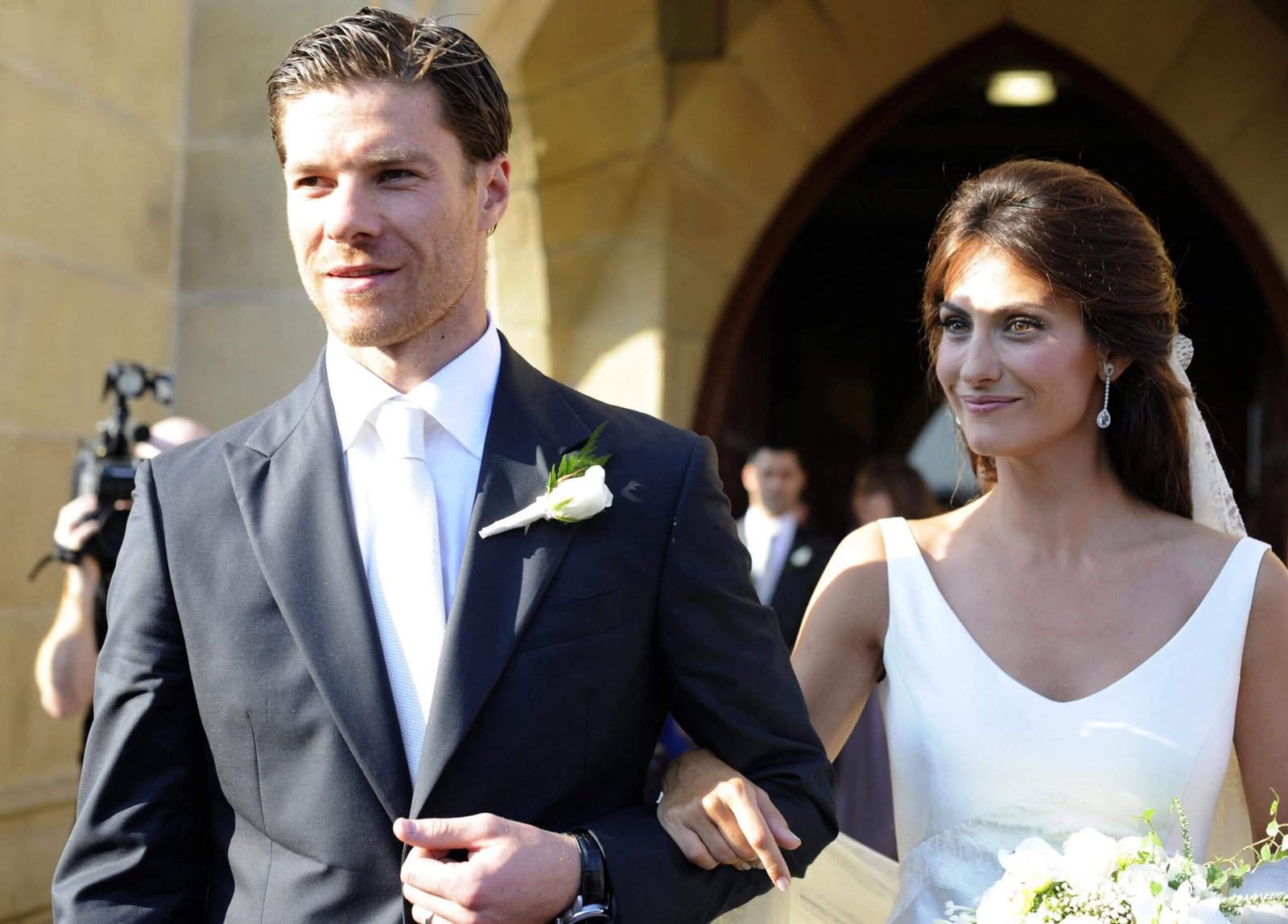
Alonso and Nagore Aranburu embraced life in Liverpool (Miren Saez/AFP via Getty Images)
He was a regular at La Vina, a Spanish tapas restaurant, and enjoyed trips to Sefton Park, the Beatles Museum and arthouse cinema Fact. Nagore worked as a receptionist at the plush Hope Street Hotel as she wanted to improve her English.
“They really connected with Liverpool as a city,” former Liverpool striker Neil Mellor tells The Athletic. “Xabi wouldn’t jump on a plane back to Spain if he had a day or two off. His outlook was: ‘This is my home now.’
“There had been a bit of a clique with the French players under Gerard Houllier. But the Spanish boys who arrived after Rafa took over made a big effort to get to know everyone and Xabi was crucial to that. You’d watch him in training and think, ‘Wow, what a player he is’, but he was always humble with it.”
Academy graduate Stephen Warnock, who made the breakthrough into Liverpool’s senior ranks early in 2004-05, agrees.
“Xabi was funny and quick-witted, great to have around, an absolute gentleman. He and his wife always made a big effort when the players and their partners got together for social events. They loved being based right in the heart of the city as they wanted to immerse themselves in the culture.
“On the field, he seemed to have a picture in his head of everything going on around him before the ball came to him. We used to call him the ‘spray gun’ because he could spray a pass anywhere.”
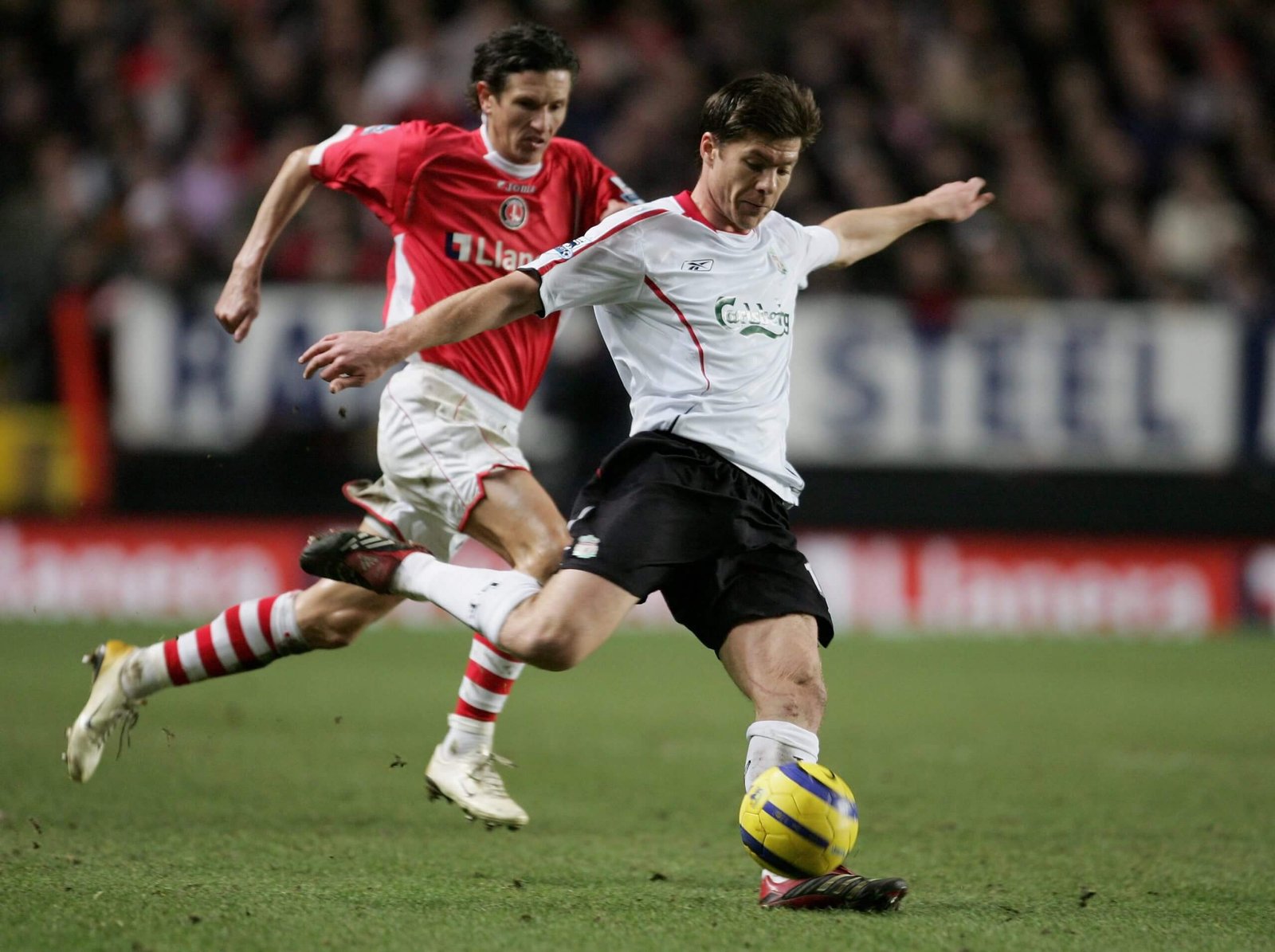
Alonso’s passing range stunned his teammates at Liverpool (Richard Heathcote/Getty Images)
Alonso read up about Liverpool’s history and attended meetings of the Merseyside branch of the official supporters’ club to do Q&As with the fans.
“He was so generous with his time — answering everything and then staying after to sign all the autographs and pose for all the photos,” chairman Les Lawson, an Anfield regular since the 1970s, explains.
“Not many Liverpool fans knew a great deal about him when he first arrived. But very early on, you thought: ‘Wow, this guy can play.’ He wasn’t the biggest, he wasn’t the quickest but he was tough. He wasn’t afraid to put his foot in and he was one of the best passers of the ball I’ve ever seen.”
The setting was Bayern Munich’s Sabener Strasse training base in March 2017.
Having announced his intention to retire at the end of that season, I spent an hour with Alonso while working for the Liverpool Echo newspaper.
He was on the brink of landing a third successive Bundesliga title with Bayern. He had previously won La Liga and the Champions League with Real Madrid, while being part of Spain’s golden generation who clinched back-to-back Euros either side of a maiden World Cup triumph.
But the conversation was dominated by his enduring bond with Liverpool — the city where the first of his three children, son Jon, was born in 2008.
“Expectations were high when I arrived there, but the moments and the feelings were even better,” he said. “The mystique of coming down that tunnel at Anfield, touching the sign, the Kop singing You’ll Never Walk Alone. I really loved it from the first moment.
“The personality of Liverpool people is very particular. They like you to be one of them. If you are in the bar, they offer to get you a pint. They want you to feel welcome. I felt that from the very beginning. Liverpool is still a big part of my life and always will be. It’s not a normal club.”
He talked about the glorious highs and the crushing lows — the broken ankle sustained against Chelsea on New Year’s Day 2005 and how, after a special plea from Benitez, he made his comeback against Juventus in the Champions League quarter-finals three months later.
He missed the second leg of the semi-final against Chelsea due to suspension, but started the final and completed the miraculous fightback from 3-0 down against AC Milan. When his penalty was parried by Dida, he reacted quickest to slam the rebound into the roof of the net. Jerzy Dudek’s heroics in the shootout sparked wild celebrations.
“Everyone went absolutely crazy,” he recalled. “A million people were on the street of Liverpool for the parade. I felt what it meant for the club to be back on top of Europe after 21 years.”
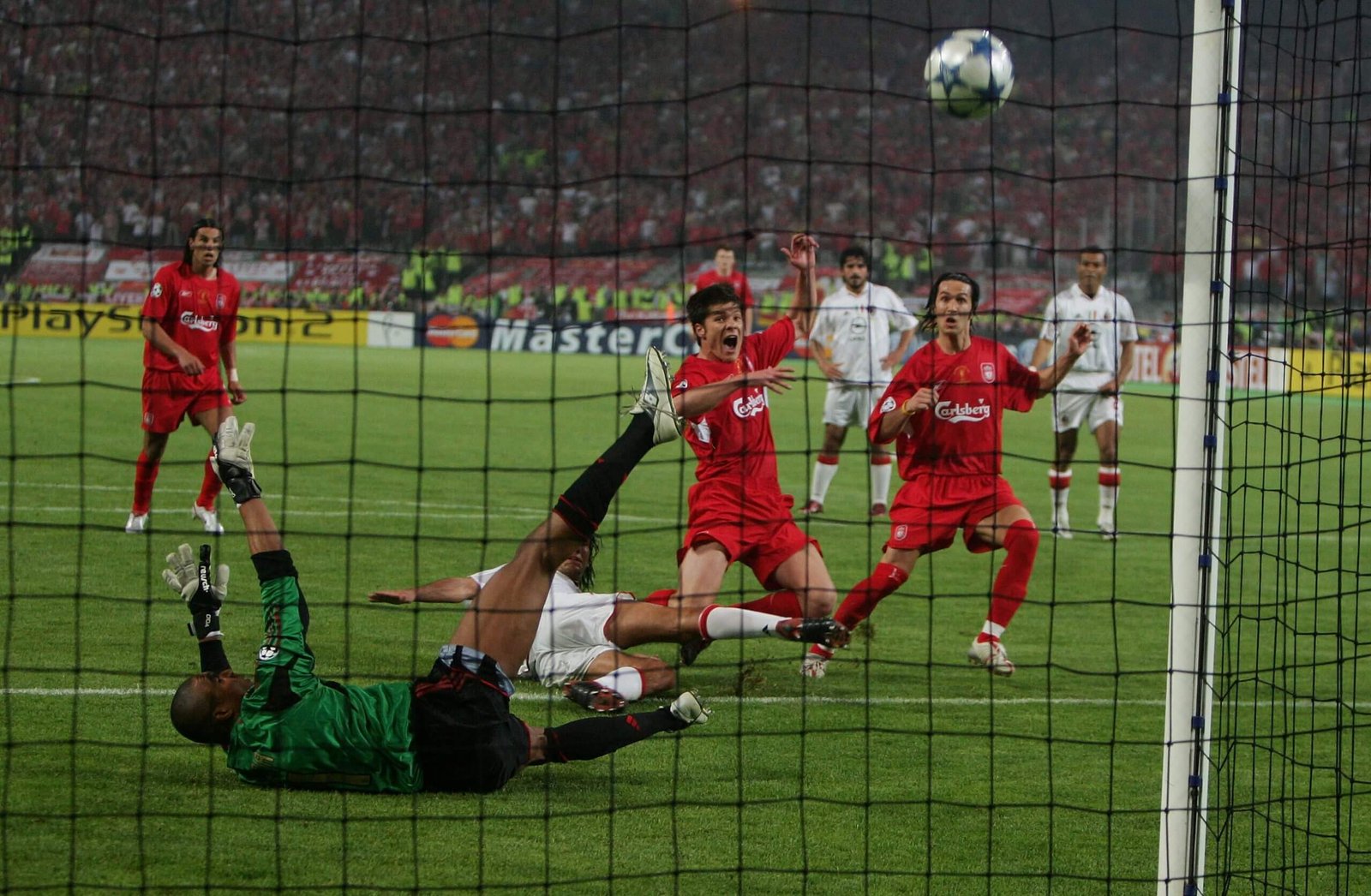
Alonso scores Liverpool’s equaliser in the Champions League final against Milan (Mike Hewitt/Getty Images)
Alonso lifted the FA Cup in Cardiff 12 months later, an achievement sandwiched by stunning goals from inside his own half against Luton Town and Newcastle United. Those audacious long-range strikes were no surprise to Pepe Reina as Alonso would frequently try to catch him out during training at Melwood.
Hopes of a second Champions League triumph with Liverpool were dashed when Milan got their revenge in the final in Athens in 2007. His form dipped the following season and injuries reduced his playing time. That led to Benitez controversially trying to replace him with Gareth Barry in the summer of 2008.
The message from the Kop was clear during a pre-season friendly with Lazio when they chanted: “You can stick your Gareth Barry up your a***.”
Ultimately, owners Tom Hicks and George Gillett refused to match Aston Villa’s £18m valuation of Barry. Alonso, who was also being pursued by Arsenal and Juventus, stayed put.
“The Barry story is something that still people don’t understand,” Benitez told The Athletic in 2019. “Barry had been playing for years at his maximum level and, at this time, he could play in three positions — midfielder, winger and left-back.
“We had Javier Mascherano, Lucas Leiva and Gerrard with experience, and selling Alonso was a way to make some money and balance the team. Barry wasn’t to replace Alonso, he was to give us something different that we didn’t have at this time.”
Carragher adds: “I think most people found it strange that Rafa wanted Barry to come in and for us to sell Xabi as there was no comparison between the players.
“But Rafa felt Barry could give him more options in terms of positions. The strange thing was Barry told me and Stevie when we were away with England that he wouldn’t have signed for Liverpool if there was a chance he would play left-back.”
Alonso had missed a Champions League trip to Inter Milan in March 2008 to attend the birth of his son but in our 2017 chat, he dismissed suggestions that had sparked a breakdown in his relationship with Benitez. Instead, the manager told him he was open to selling him the following summer.
“Rafa was quite open,” he recalled. “I said, ‘Of course, I need to accept this, you are the one who makes the decisions.’ I was really close to Juventus and Arsenal. It came down to £3m. I think Liverpool were asking for £18m and both offered £15m — that’s why it didn’t happen.”
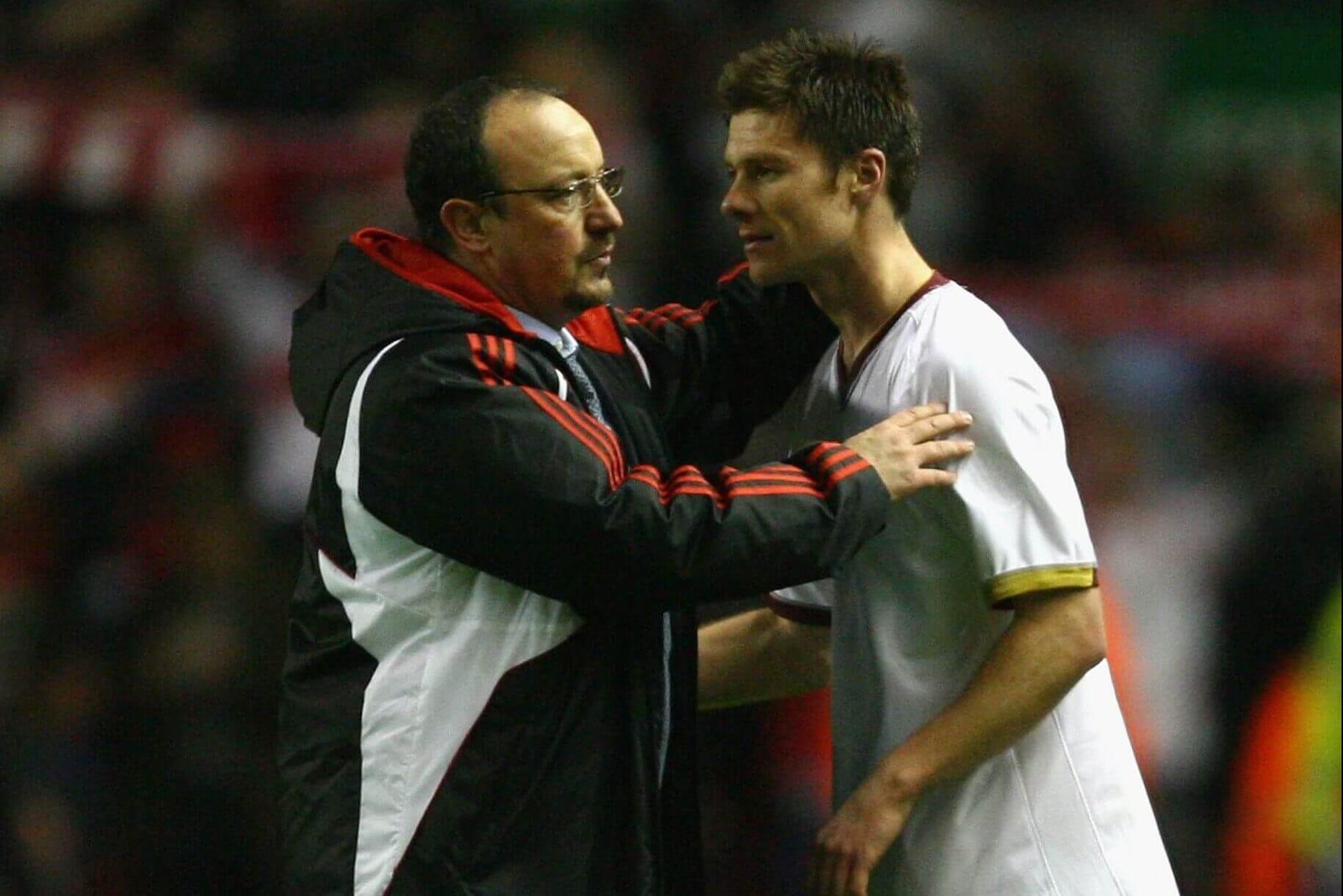
Alonso’s relationship with Rafael Benitez came under strain (Alex Livesey/Getty Images)
Alonso denied that he felt he had a point to prove but it was surely no coincidence that 2008-09 was his best season for the club. He was immense alongside Javier Mascherano with Gerrard released to play behind Fernando Torres. Liverpool suffered just two league defeats all season but finished four points behind champions Manchester United.
As interest from Spanish giants Real Madrid cranked up, Alonso’s exit in the summer of 2009 was increasingly inevitable. Shortly after the club’s pre-season tour of Asia, a £30m deal was agreed.
The sense of loss at Anfield intensified as his replacement Alberto Aquilani struggled to make an impact and Liverpool’s fortunes nosedived as the debt-ridden ownership of Hicks and Gillett took its toll. Within a year, Benitez had departed after a miserable seventh-place finish.
For some players, the decision to cut their ties with Liverpool tarnishes their legacy, but that wasn’t the case with Alonso.
“I think most people understood the situation,” Hamann says. “Rafa had tried to sell him the previous summer and there were seemed to be some problems between them. Then you had the mess at Liverpool with the ownership situation. Not many clubs in world football are bigger than Liverpool but he probably joined one of them in Real Madrid.”
Warnock adds: “It was a sad day when he left. It hurt losing such a quality player. Xabi had shown a lot of dignity with what happened the year before. Many were baffled why you’d want to sell someone so gifted. He never spoke badly about the club or anyone in the press. It can’t have been easy but he took it on the chin and was brilliant in his final season at Liverpool.”
Alonso never got the chance to say a proper goodbye but he has returned to Anfield since to play in legends matches for the LFC Foundation and been serenaded by the Kop.
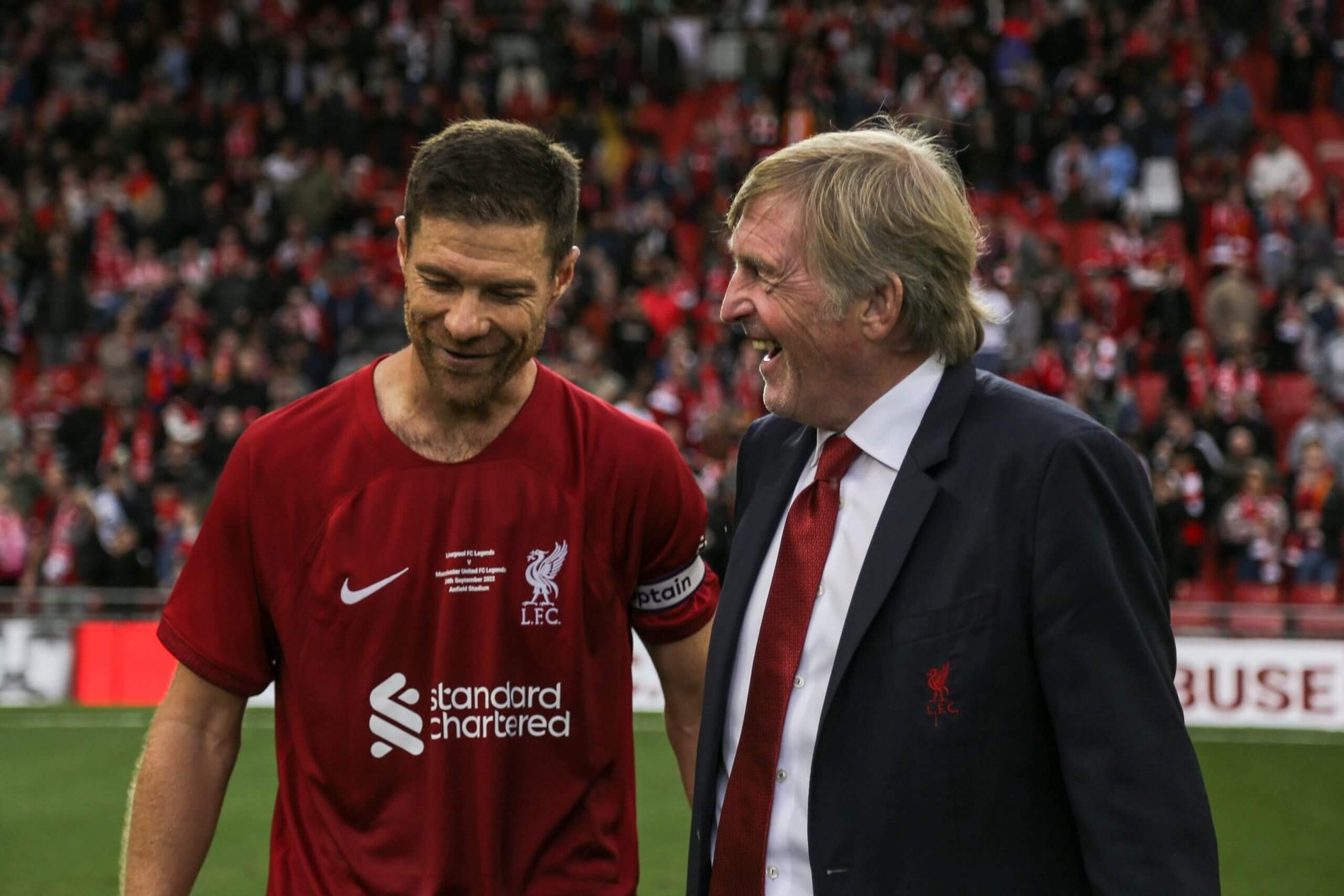
Alonso with Sir Kenny Dalglish at a Liverpool Legends game in 2022 (LFC Foundation/LFC Foundation via Getty Images)
“Leaving was never held against him and rightly so,” Lawson says. “It was a sad indictment of where the club was at in the Hicks and Gillett era that we had to sell Xabi one year and Mascherano the next. Not many players leave Liverpool and go on to achieve even greater things, but Xabi did at Real Madrid and Bayern.”
There was interest from the Premier League when he prepared to leave Real Madrid in 2014, but Alonso was adamant that he would never represent another English club and opted to move to Germany instead. As he put it in 2017, “I played for the best club in England, the best club in Spain and the best club in Germany.”
Now, through his impressive body of work at Leverkusen, he has earned the right to be on the touchline for a big Champions League night at Anfield. The memories will come flooding back and the adoration he commanded during his playing days at Liverpool remains firmly intact.
(Top photo: LFC Foundation/Liverpool FC via Getty Images)
Read the full article here


